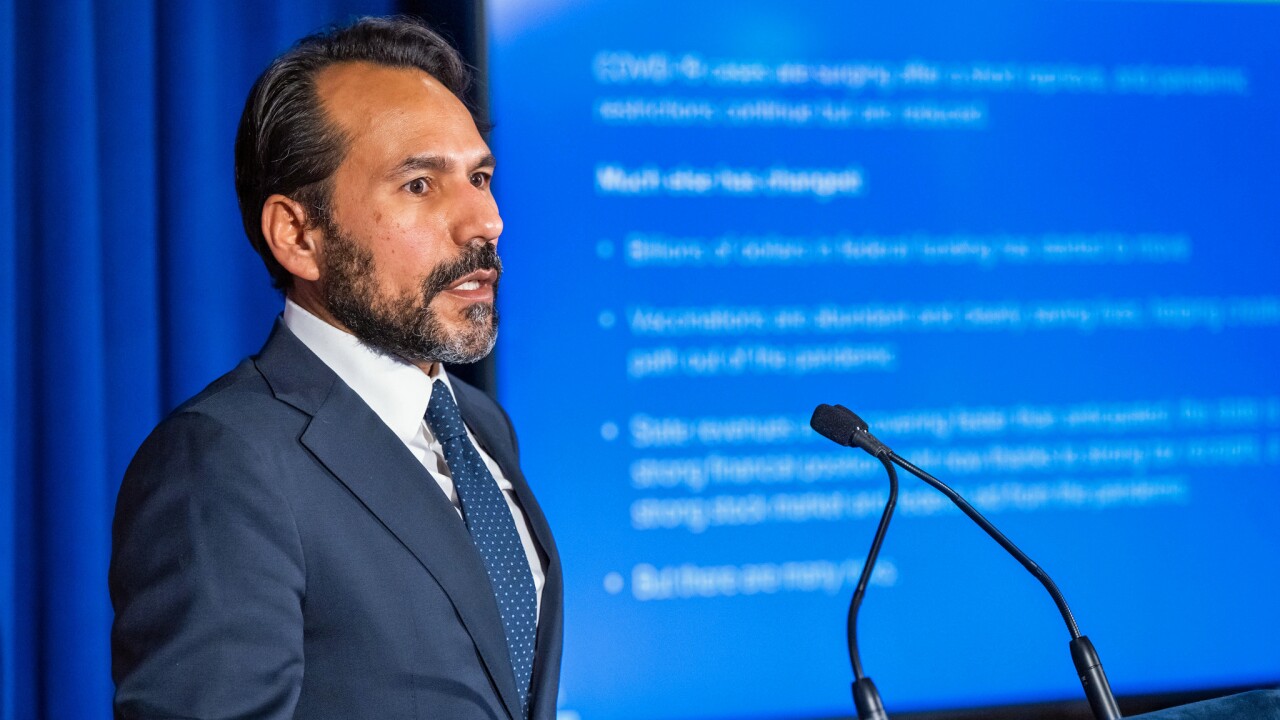As anticipated, Maryland's large general obligation deal priced Wednesday, picking up aggressive bids that bumped up MMD yields along the mid to long end of the curve. While the bump was noticeable, it wasn't as high as the market had braced for.
The three-part state of Maryland deal was priced for institutional sale Wednesday, tapping the market for a total of more than $1.1 billion. The largest piece, coming in at $649.7 million, was won by Morgan Stanley. The bonds were priced with yields ranging from 1.43% with a 5.25% coupon in 2020 to 2.17% with a 5% coupon in 2024. The bonds are not callable.
"It was bid on very aggressively," a trader in New York said, pointing to a scarcity of Maryland paper in the market.
The $449.62 million that was auctioned was won by JPMorgan Securities, with yields ranging from 0.55% with a 5% coupon in 2017 to 3.05% with a 3% coupon in 2029. The bonds can be called at par in 2022.
The smallest part of the deal totaling $50.4 million came as a negotiated issuance which Citibank priced with yields ranging from 0.56% with a 2% coupon in 2017 to 1.49% with a 5% coupon in 2020. These bonds don't contain a call option.
The three major rating agencies gave the bonds triple-A ratings.
"Maryland trades as good as anything out there," said a trader in North Carolina. "There's been really good reception in the primary lately, now that you have Puerto Rico headwinds out of the way stabilizing the situation ... and with treasuries doing very well. There's cash to be put to work and a lack of supply."
Using the state of Georgia as a comparable, some of the market found the Maryland deal too rich for their portfolios. Yields on the state of Georgia GO 5s in 2024 were at 2.19% in round lot trading today, essentially flat from 2.2% on Monday.
"We looked at Georgia and North Carolina for comparison [to Maryland] in the secondary and we found the deal didn't make sense for us," said the North Carolina trader.
The deal pushed MMD up less than traders expected. Muni yields strengthened Wednesday, with yields on bonds maturing in 12 to 29-years falling three basis points and yields on bonds maturing in 8 to 11-years slipping four basis points. Yields on bonds on the short end of the curve were unchanged. This is the seventh straight day munis have rallied, according to Municipal Market Data's triple-A scale.
"I'm surprised it wasn't impacted more," said a trader in New York.
Maryland's GO deal was one of just a handful of "gold standard triple-A" deals so far this year that carry the high credit quality and size large enough to substantially impact MMD, making the deal particularly important for determining market yields.
As all eyes were on Maryland, the market shrugged off news of rating changes. After the commonwealth of Pennsylvania's GO was downgraded Tuesday, yields in secondary trading strengthened in trading Wednesday. Yields on the commonwealth's 5s in 2022 fell slightly to 2.34% today from 2.35%. Moody's downgraded Pennsylvania to Aa3 from Aa2, and assigned a stable outlook. The move affected $11.1 billion of GO debt.
More downgrades may be on the horizon for Pensylvania's GO. In an interview with The Bond Buyer on Tuesday, Alan Schankel, a managing director at Janney Capital Markets said he "wouldn't be surprised if Standard & Poor's and Fitch lowered their ratings also."
An upgrade to the New York state GO credit from Standard & Poor's had little impact on trading, with only small one-off odd lot trades floating in the market, the New York trader said.
"Their tax revenue won't be as strong as people thought, which makes the upgrade weird to me," he said.
Standard & Poor's upgraded the state of New York's GO today to AA-plus stable.
Also in the secondary, tobacco bonds strengthened even with uncertainty surrounding a merger announcement of Reynolds American & Lorillard. Yields on a tranche of 2007A tobacco settlement asset backed senior TURBO term bond's 5.875s in 2047 fell to 7.75% today from 7.77%.
"It's come back, but it's still very tentative," said a trader in California.
Market participants were also interested in housing bonds Wednesday afternoon thanks to positive performance and attractive spreads. These bonds have experienced overall yield concessions this year, according to a trader in California.
A trader in Virginia pointed to the Georgia Housing and Finance Authority's single family mortgage 3.2s in 2023 as a benchmark. Yields on the bonds have fallen to 2.75% on July 22 from 3.28% when they traded in February 2012.
"There are some nice housing pieces we've seen, it's one of the only sectors in munis where you can still find some spread," the trader said. "We have been pretty active in some secondary housing names."
He said that his group is looking at housing names in Georgia, North Carolina, New York and Florida.
"[Housing] is a sector where there is still a little bit of value," he said. "That and healthcare, especially housing now because larger national healthcare names are trading super tight."
Housing bonds are attractive because they tend to trail rallies and are more defensive in down markets, the trader in California said.
"There's been a big move to lower-rated housings because they do not lockstep with any rate move," the California trader said. "When looking for spread products people tend to focus more on housings during a rally."
According to the Municipal Market Advisor's 5% triple-A scale, the 10-year benchmark dropped four basis points to 2.19%, the 30-year yield fell two basis points to 3.40% and the two-year note held steady at 0.31%.
Treasuries were mixed Wednesday, with the 10-year benchmark and the two-year note falling one basis point each to 2.47% and 0.48%. The 30-year note rose one basis point to 3.27%.





